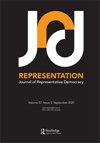是什么决定了政党对现任重新提名方法的选择?英国工党案例,1979–2019
Q2 Social Sciences
引用次数: 1
摘要
摘要英国工党在1979年至2019年间六次改变现任议员的重新提名程序。以工党为例,我提出了一个由两部分组成的理论来解释政党对现任重新提名方法的选择:谁控制着该党,以及他们是否认为议员受到议会领导层或议会外政党的约束。重新提名是党内候选人选择的核心,影响政党、立法机构、政府和反对派的运作。调查结果扩大了我们对党内组织动态和现任候选人重新提名过程的理解。本文章由计算机程序翻译,如有差异,请以英文原文为准。
What Determines Parties’ Choice of Incumbent-Renomination Methods? the Case of the UK Labour Party, 1979–2019
ABSTRACT The UK Labour Party changed its incumbent-renomination process six times between 1979 and 2019. Using Labour as an influential case, I propose a two-part theory explaining parties’ choice of incumbent-renomination methods: who controls the party, and whether they believe MPs are bound by dictates of the parliamentary leadership or the extra-parliamentary party. Renomination is central to intra-party candidate selection affecting the functioning of parties, legislatures, governments and oppositions. Findings expand our understanding of intra-party organisational dynamics and incumbent-renomination processes.
求助全文
通过发布文献求助,成功后即可免费获取论文全文。
去求助
来源期刊

Representation
Social Sciences-Sociology and Political Science
CiteScore
3.50
自引率
0.00%
发文量
31
期刊介绍:
This change in scope follows two paths. Firstly, it seeks contributors who are interested in exploring the interface between democratic practice and theory. In particular, this focus seeks contributions that apply theoretical insights to actual examples of current practice. Secondly, while not neglecting the current focus of the journal, we would like to expand its international coverage so that the journal will offer our readers insights in the state of democracy worldwide.
 求助内容:
求助内容: 应助结果提醒方式:
应助结果提醒方式:


